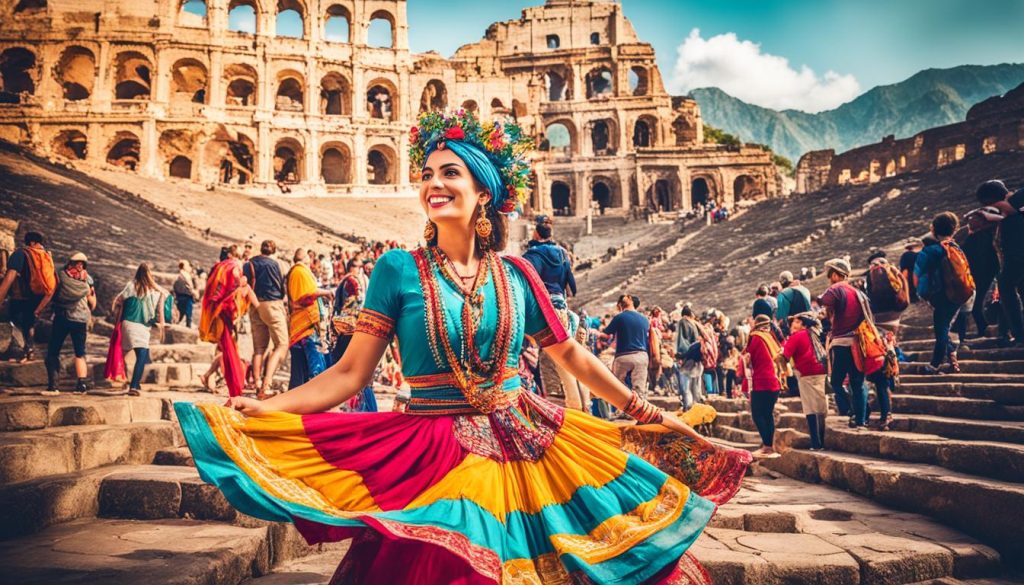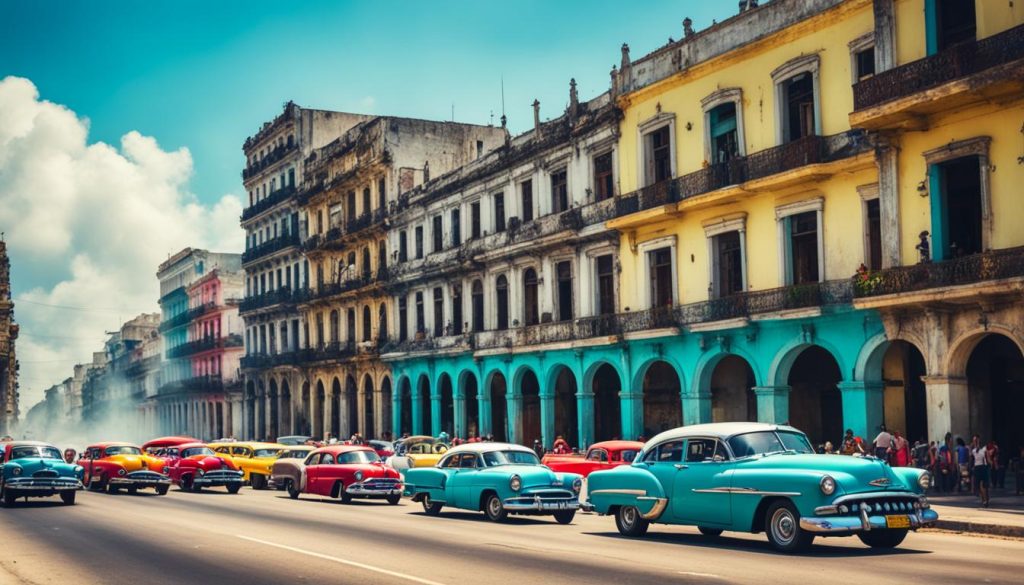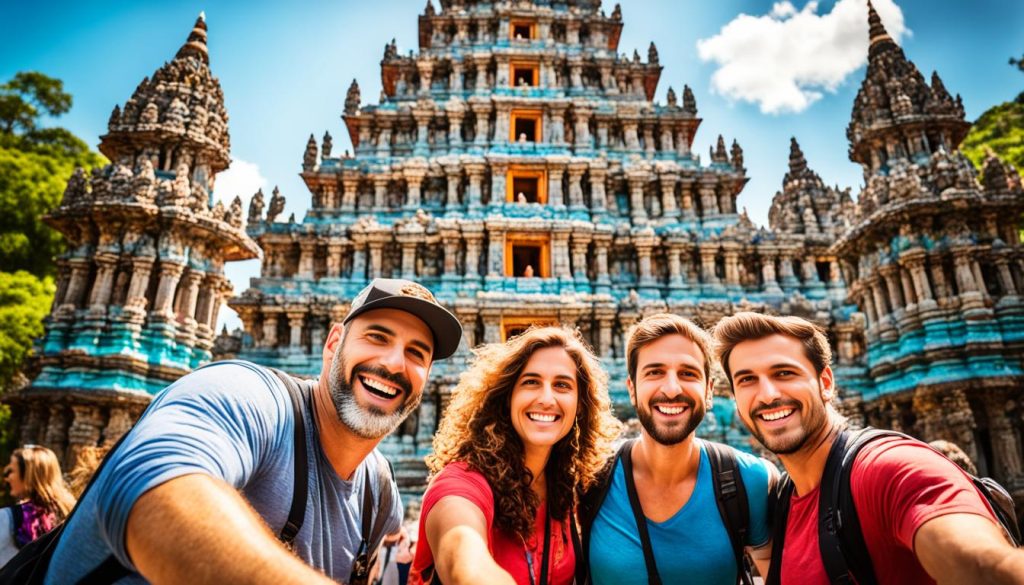“Travel is fatal to prejudice, bigotry, and narrow-mindedness. Many people need it to grow. Being broad-minded and kind towards others comes from seeing the world.” – Mark Twain
When you travel, you break away from the familiar. You dive into diverse cultures worldwide. Cultural travel exposes you to local traditions, heritage sites, indigenous cultures, culinary exploration, artisan crafts, festivals and ceremonies, and living history. These aspects define each location. They tell you more about the people and their stories.
This journey expands your knowledge through cross-cultural exchange. You get to know the world better. Plus, you understand and appreciate the differences.
Key Takeaways
- Cultural travel immerses you in diverse traditions, customs, and ways of life around the world.
- Experiencing local cuisine, crafts, and festivals provides a deeper connection to a destination.
- Cultural travel fosters cross-cultural understanding and appreciation for different perspectives.
- Visiting heritage sites and learning about a region’s history enhances your travel experience.
- Cultural travel allows you to leave a positive impact by supporting local communities and preserving traditions.
What is Cultural Travel?
Cultural travel isn’t just about seeing new places. It’s about diving into how locals live. This way, you get to truly understand and respect their way of life. It’s a perfect way to explore the globe. You take part in various traditions and learn from each culture.
Definition and Importance
Cultural travel means trying new things and experiencing life as locals do. It’s more than seeing the sights. You eat their food, sleep in their houses, and meet people. This helps you truly understand the history and culture of a place. It opens your eyes to the world and its diversity.
In our global world, cultural travel is super important. It lets us reach out to different communities. This kind of travel helps us see the beauty in various ways of life. By becoming a part of the local scene, you get a much richer travel experience. Plus, you help keep traditions and heritage alive.
“Cultural travel is not just about sightseeing; it’s about understanding the essence of a place, its people, and their way of life.” – Jane Doe, travel writer
Whether it’s in a busy city or a quiet village, cultural travel is an eye-opener. It lets you see the world in a new light. You take a break from what you know and learn new things. It helps you grow and see the beauty of life in different places.
Benefits of Cultural Travel
Cultural travel adventures can really change you for the better. When you step into a new culture, you grow in many ways. You learn from other cultures, become more confident, and have great learning experiences.
Exploring new cultures helps you grow as a person. You learn to be independent and adaptable. These skills are useful in various parts of your life.
Travel also makes you a better storyteller. You gather unique experiences that make great stories. This makes you more fun in conversations and helps you make new friends.
Moreover, it helps you be less critical and more open. Discovering new beliefs and issues makes you appreciate the world’s complexity more. This leads to understanding and empathy for others.
“Traveling – it leaves you speechless, then turns you into a storyteller.” – Ibn Battuta
Cultural trips can change your life. They help you grow, understand others better, and boost your confidence and learning. Embracing different cultures makes you a richer, more complete person.
Package Tours vs. Independent Travel
Travelers often debate between package tours and going it alone. Package tours offer a ready-made, easy path. On the other hand, independent travel lets wanderers forge their way at will. It’s good to know the highs and lows of both to make a well-informed choice for your cultural getaway.
Pros and Cons
Package Tours:
- They are well-structured with planned schedules and arranged travel.
- First-timers or those flying solo find a comforting safety net.
- You might save money through group deals and all-in-one deals.
- They limit your chance to dive deeply into local ways.
- You could find yourself tied to a set schedule.
Independent Travel:
- You get to set your route for a more personal cultural dive.
- Flexibility lets you see the world at your own speed.
- True thrill-seekers and the independent-minded love the freedom.
- It takes more homework and leaves room for unexpected twists.
- Those looking for guidance may feel lost without a fixed plan.
Semi-independent travel melds the best of both worlds. You get to chart your own journey yet partake in select group events with community hosts. It lets you enjoy the perks of both guided and self-guided trips.
Choosing comes down to your comfort with risk, finances, schedule, and desire to truly know a place. Both paths can lead to enjoyable, meaningful discoveries when you keep local culture and community well in mind.
“The real voyage of discovery consists not in seeking new landscapes, but in having new eyes.” – Marcel Proust
Cultural Travel
Cultural travel is more than just seeing places. It lets you dive into how locals live. You get involved in local life by trying new things, joining celebrations, or eating local food. This type of trip lets you really understand and enjoy a place’s culture.
Traveling this way, with care and respect, is good for the places you visit. It helps keep traditions alive and supports local people. But, it also makes us think about what’s truly local and when culture might be used just to sell things.
“Cultural travel is not just about sightseeing; it’s about engaging with the soul of a place and its people.”
To have a truly rewarding cultural travel experience, you need to be open and eager to learn. Respect for local ways is key. This kind of journey leads to rich experiences, where you not only see but really connect, all while leaving behind a positive mark.

Top Destinations for Cultural Travel
Antioquia Department, Colombia
The Antioquia Department in Colombia is a gem for cultural trips. Its lively capital, Medellin, shines with its Paisa culture. This culture is rich in its own unique language, food, music, and customs.
When in Antioquia, trying the bandeja paisa is a must. It’s a big meal that tells the story of the area’s farming history. You can also dive into local life at the San Alejo Handicraft Market.
The region also boasts a strong art scene. Visit colonial towns to see local crafts. And don’t forget to visit Medellin’s Comuna 13. It’s a great example of how the city is changing for the better.
Walking around Antioquia, you’ll feel the culture in every step. You might find yourself dancing to their lively music. Or perhaps, joining in the colorful local festivals. Antioquia opens a door to understand the vast beauty of Colombian culture.
“Antioquia’s cultural wealth is not just a feast for the senses, but a journey that connects you to Colombia’s proud Paisa identity.”
https://tunekong.com/indoor-plants-101-the-best-green-companions-for-a-fresh-vibrant-home-12/
Cuba
Step into the enticing world of Cuba, a Caribbean jewel that draws in travelers. The island’s culture mixes Indigenous, Spanish, and revolutionary influences. It’s known for its blend of African, European, and Asian heritage.
Exploring in vintage American cars is a must in Cuba. These cars symbolize the nation’s resilience. They show Cuba’s rich car history and its people’s cleverness.
Staying at casas particulares gives you a close look at Cuban life. It connects you with the friendly Cuban people. You learn about their lives and customs in a personal way.
Cuba’s music, dance, and art are a true revelation. You’ll find vibrant rhythms like salsa and son cubano. The streets are alive with colorful murals and sculptures, showcasing Cuba’s artistic flair.
“Cuba is not just a country, it’s a state of mind.” – Fidel Castro
Despite its complex history and politics, Cuba remains an inviting cultural hotspot. While exploring places like Havana and enjoying local customs, you’ll see the island’s true spirit.

Embracing Cuban Culture
To truly dive into Cuban culture, try these exciting things:
- Join a salsa or rumba dance class to feel the rhythms the world loves.
- Visit a cigar factory and watch experts roll cigars, showing Cuba’s craft.
- Walk through Old Havana’s colorful streets, a UNESCO site, and see its history.
- See a show of Cuban music and dance in one of the famous Cuban theaters.
- Admire Havana’s mural art, which reflects the island’s diverse culture.
These experiences will deepen your understanding of Cuba. They’ll leave you with beautiful memories of this unique place.
30 Countries for Cultural Tourism
The Antioquia region of Colombia and the lively Cuba are just the beginning. Around the world, top destinations await your discovery. You can delve into historic sites, enjoy local food, and take part in festivals. This opens a door to varied cultures across the globe.
Ecuador is rich in cultural wonders, from the Galapagos Islands to its food. The Big Island in Hawaii mixes Polynesian, Asian, and Western influences. Here, you can learn about Hawaiian traditions and see hula dancing in action.
In the United States, New Orleans shines with its vibrant scene. It’s known for jazz music, Creole dishes, and Mardi Gras. Oaxaca, Mexico, is loaded with heritage sites and community-based tourism. It offers a chance to dive deep into its cultural fabric.
In Asia, Africa, and Europe, you’ll find immersive cultural experiences waiting. India’s traditional festivals and Morocco’s handicraft workshops are just a start. The world of cultural tourism invites you to truly connect with communities and their traditions.
“Cultural travel is not just about sightseeing; it’s about forging connections, understanding different perspectives, and broadening one’s own horizons.”
Are you drawn to ancient sites, local food, or community experiences? The world is brimming with chances for cultural exploration. Open yourself to these experiences. You’ll gain a richer understanding of our planet’s incredible diversity.
Cultural Experiences Around the World
Embarking on a cultural travel journey opens up a world of enriching experiences. These go beyond the usual tourist spots. You’ll learn traditional handicrafts and get into vibrant festivals and rituals. These experiences show you the colorful variety of human life.
A homestay program is an exciting way to know a culture. Living with a local family lets you see their daily life. You eat their authentic food and make friends with your hosts. It’s a chance to make baskets in Vietnam or cook in Tuscany. These activities help you understand the local ways deeply.
For those who like adventure, volunteering is a great choice. You’ll help local groups and learn about their issues. Teaching English or saving animals, these activities make you feel like a global citizen. You see how strong people can be in the face of challenges.
Dancing at a Balinese festival or joining an Amazon ritual is thrilling. Exploring Laos’ villages that float is eye-opening. Cultural travel helps you push your limits and dive into human diversity. It opens your mind and heart to the world.
“The real voyage of discovery consists not in seeking new landscapes, but in having new eyes.” – Marcel Proust
Choosing a Cultural Tour Company
Choosing the right tour company is key for your cultural trip. Pick one that supports Responsible Tourism, Community-Focused travel, Ethical Travel, and Sustainability. This means they are mindful of their impact and care for local groups.
Look for key things to have a meaningful and ethical trip:
- Choose businesses that are based in the area and put money back into the community.
- Get guides who really know the place and can show you its heart.
- Take tours in small groups to keep the environment and locals happy.
- Stay with locals or in community setups to get a deeper cultural experience.
Avoid big, all-inclusive resorts and cruises. They may harm the environment and locals. Focus on tour companies that aim for sustainable and good travel practices instead.
“Choosing a responsible and community-focused tour company is the first step in having a truly meaningful cultural travel experience.”
Researching and choosing the best tour company makes your travel count for good. You’ll engage with the local culture in a genuine and respectful way.
Tips for Immersive Travel
To truly dive into a culture, remember some key tips. Embrace independent travel. This allows you to explore using local transportation. You can ride buses, trains, or even motorbikes. It gives you a real view of the country and helps with meeting locals.
Choosing local guesthouses and homestays over big hotels is great for culture. Also, learn some basic words in the local language. It can help you make real connections with people.
Key is to be open and to step out of your zone. Talking to locals, tasting new foods, and going to less-visited places are big steps. These things truly blend you into the culture and help understand the place better.
- Embrace independent travel to navigate using local transportation
- Opt for local accommodations like guesthouses and homestays
- Make an effort to learn some basic words and phrases in the local language
- Approach each new experience with an open mind and a willingness to step outside your comfort zone
- Engage with locals, try new foods, and explore off-the-beaten-path destinations
“The most memorable travel experiences often come from connecting with locals and immersing yourself in the culture. It’s about more than just sightseeing – it’s about truly experiencing the place you’re visiting.”
These tips can make your cultural journey more meaningful. Stay open and ready to try new things. This is how you really become part of the world’s diverse cultures.
Conclusion
Cultural travel is a great way to see the world and learn about different cultures and traditions. You can support local communities and make real connections by keeping an open mind. This leaves a positive impact wherever you go.
Festivals, historic places, or projects helping local areas, there’s much to see and experience. Planning your travel to make a difference can lead to a journey filled with discovery and growth.
Exploring the world’s cultures lets you see things in a new light and appreciate its diversity. It’s a chance to learn, connect with others, and do some good in the places you visit.
FAQ
What is cultural travel?
Cultural travel is more than just visiting a place. It’s about experiencing and keeping alive the world’s different customs. This includes living how locals do, eating their food, and learning about their culture and history.
Why is cultural travel important?
It opens your mind to new things and lets you see the world from another’s view. This form of travel fosters deeper connections with the places you go to. It also helps tradition survive and local businesses thrive.
What are the benefits of cultural travel?
Traveling this way can boost your confidence and your understanding of diverse cultures. It can make you more tolerant and knowledgeable about things like history and politics. Plus, it’s a great way to have unique stories to share.
What’s the difference between package tours and independent travel?
Package tours often show you just the basics of a place, keeping you in a safe bubble. On the other hand, independent travel lets you dive deep into local life. It means planning your own trip and dealing with the unknown, but the rewards can be greater. Semi-independent travel mixes both.
What are some examples of cultural travel experiences?
These experiences can range from learning traditional skills to being part of a local festival. Eating local food, staying with a local family, and volunteering are also great ways to immerse yourself. They offer real insights into a culture and help you make genuine connections.
How can you find responsible cultural tour companies?
Look for tour companies that are run by local people and hire guides from the area. It’s good to support businesses that put money back into the local economy. Avoid big resorts or cruise ships. Instead, go for tours that are small, homestays, and community projects. These choices offer real, sustainable cultural experiences.
What tips can you follow for a more immersive cultural travel experience?
To really get into a culture, use the local way of getting around, stay in local places, and learn a bit of the language. Keep an open mind to all new things. Talk to locals, taste the food, and visit places not many people go to. This way, you’ll live the culture, not just see it.

